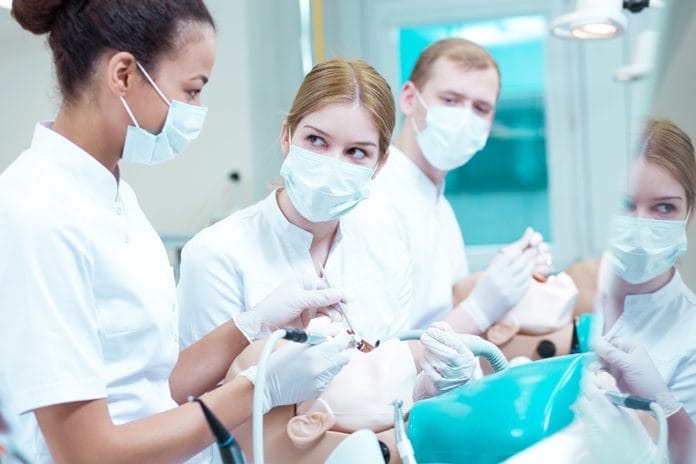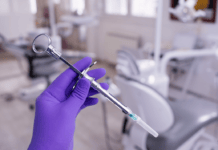It is the exam you’ve studied your entire dental hygiene education for. The upperclassmen have groaned to your class about it, your faculty has alluded to it, and you’ve already asked for board review books for Christmas.
You’ve walked through the steps of grief, beginning with denial, “Maybe if I do well in school, they will let me skip my boards,” moving through anger, “Why are they doing this to me,” and then finally acceptance, “How am I going to do this?” As any practicing hygienist will tell you, the memories surrounding our board examinations have been shoveled into an area of our memory centers that we simply wish not to tap into.
As the founder and keynote speaker for Sanders Board Preparatory, a dental hygiene board review company, I have worked with countless dental hygiene students who experience the distress associated with preparing for national boards. After all, nothing is more confusing than truly not understanding HOW to answer a question, or worse, not understanding WHAT the question is asking in the first place!
Rest assured, I have included the top five tips I give my students to help secure a successful passing score on their national board examination. Take a break from studying and check out these tips which are sure to help support you in your journey to a successful score.
1) Slow Down and Think Through the Questions
One thing I often find is dental hygiene students tend to stress over difficult or wordy questions. Students may glaze over a question that includes an unfamiliar word or may simply give up on thinking through the question due to a lengthy
Often, students think, “Well, this is one of the questions I will get wrong,” they pull a guess out of thin air, and move on. Here’s the challenge, with every question not thought through and with every uneducated, out-of-the-blue guess made, confidence declines. In turn, performance on the examination continues to decline, as the focus of the exam moves from an “I got this” attitude to “I don’t understand ANY of this.”
As I say during Sanders Board Preparatory, the Joint Commission does not intend to confuse the test taker. Remember, their job is to test competence and depth of knowledge. Because of this, I tend to make recommendations which help the test taker feel confident in massaging a question to yield the correct answer.
Analyze the multiple-choice options after the question. Of note, if two answers are opposites of each other, it is likely that one of those two options is the correct answer. For example:
“Which of the following factors would result in dark radiographs?”
- Films were beyond the expiration date
- Developing solution was too cold
- Exposure time was too short
- Exposure time was too long
In this question, both options 3 and 4 are opposite, indicating one is likely the right answer. Narrowing down your options to only two remaining helps the odds of a successful answer. In this case, the answer is 4: Exposure time was too long.
If a guess must be made, a decent means of guessing would be to select the longest written answer. Another option would be to pick the same answer every time. For example, make a decision that you will always select ‘A’ for any questions in which you are making a complete guess.
I also advise my students the answer options are completely randomized. Without realizing it, students have an inner voice that says, “We haven’t had a ‘C’ in a while…” and that may unintentionally alter the final answer selected. In fact, back in the Scantron-days, there was one year in which every answer on one entire page of the board’s examination was ‘B.’ Imagine how unsettling it must have felt to look down at a Scantron in which over 30 questions IN A ROW were the same answer. Nevertheless, this unintentional occurrence shouldn’t affect the answers selected during the examination.
2) Be Careful of Various Types of Questions
During my days as a faculty member, I noted there were several types of questions that seemed to catch students every time. While I’m sure my students felt I was using these questions to trick them, they understood the importance of tripping over those questions in hygiene school, as their board examination brought similarly constructed questions.
Question Type: Exception
These are questions that have “all of the above…except…” or “which is NOT an example of…” Believe it or not, we all want to hurry up and finish our board examination. I have yet to meet a student who wished the test would drag on and on. As such, students often read through their questions too quickly and may miss words of exception. By the time they get down to the multiple-choice options, they are thoroughly confused, strive to make a simple guess and move on. I implore you to slow down to ensure you’re noting terms of exclusion.
Question Type: Superlatives
These are questions that include words such as “always,” “every,” “all,” or “none.” While we are attaining degrees in science, remember rarely are there absolutes in human science. I encourage students to slow down whenever they see superlatives included in the stem of the question, as this may be (but not always because, well, always is a superlative, right?) an excellent indicator the statement is not completely true.
Question Type: Semi-Superlatives
These are questions that include words such as “usually,” “may,” or “generally.” While I warned of superlatives in the above paragraph, please note, the use of these semi-superlatives in a question stem often (see what I did there?) indicate a true statement.
Answer Type: “…of the above”
I always encourage students to be careful with questions whose answer options include “all of the above” and “none of the above.” Remember, the Joint Commission must develop five options for each question, and while this isn’t always the case, oftentimes options such as “all of the above” or “none of the above” are used not only as a distractor but also as two other feasible and believable options; simply because they may not have other options available to use.
3) Over-thinkers Beware!
Guilty! As a dental hygiene student, I over-thought EVERY test question provided to me. I used to blame it on the fact I was captain of the debate team in high school and could argue my way through anything (as you can see, I was a cool kid in my young adult years). Give me a question, and I can tell you why options A and B are good answers, but also C could happen if X, Y, and Z were present, and maybe even D could occur if E also happened. By the time the test is over, I’m completely confused but prepared to argue every aspect of why these questions are so confusing, and I have several Wisconsin state gold medals in public address and debate to prove it.
Here’s the deal, these questions aren’t going anywhere, and the Joint Commission takes time and care to ensure the questions are clearly laid out in a way most of the nation would understand. The problem is, 97% (that’s a number I just made up) of dental hygiene students are anxious, over-prepared overthinkers, and therefore, the most straightforward of questions can become the most confusing of all!
During my board review course, I provide examples of questions that students often overthink, and we work together to understand the root of the question. Students find this very helpful in reprogramming their thought process.
Another piece of advice I give my students is to have them picture their favorite dental hygiene faculty member. Envision this faculty member asking this question. Remember, your favorite faculty member doesn’t intend on tricking you or confusing you; they simply want the black and white answer. This may help reduce the anxiety-ridden overthinking that occurs during examinations.
4) Develop a Study Plan
I don’t have to tell most dental hygiene students twice; make sure you have a plan. This plan must begin with developing a strategy for studying. By the conclusion of hygiene school, most students understand how they study best; in the morning, after a workout, at a coffee shop, with a group, etc. What always concerns me, however, are the times when dental hygiene students create plans which are simply not do-able. Countless times, I would counsel students who set up plans to read 50+ pages of a board review book per day, and they would actually expect to retain all of the information in the book! While plans such as these are certainly ambitious, they create unreasonable expectations and set the student up for frustration in the event they are unable to maintain this plan.
Nothing is more overwhelming than looking at the textbooks and binders accumulated throughout dental hygiene school and knowing that somehow, all of that information needs to stick. In my opinion, the best way for students to set themselves up for success is to ensure they receive definitive information in a clear and concise format. Additionally, I believe learning should be fun; as I know, I learn best when I’m enjoying myself, laughing, and able to connect pieces of information to stories or tangible mnemonic devices. Despite the great help that textbooks can be, I find attending a board review course ensures consistency, clarity, and confidence during the process of studying.
Sanders Board Preparatory tirelessly aims to create a unique learning experience which gathers the best faculty as subject matter experts in an environment that keeps learning lively and enjoyable. Our 100% passing rate course includes 24 hours of interactive classroom course content taught alongside our published, full-color book and a fully recorded case studies lecture.
Intimate class sizes ensure students feel comfortable in asking questions or requesting clarification during points of confusion. We provide breakfast and lunch, snacks, prizes, raffles, and product samples. But more so, we provide mnemonics, entertainment, support, positivity, confidence, and a concierge experience with a solid guarantee of a passing examination score. But don’t take my word for it, simply ask any of the countless practicing RDHs who proudly secured their passing score under the direction of Sanders Board Preparatory. For more information, visit: www.SandersBoardPrep.com
5) Be Prepared
I encourage dental hygiene students to ensure they walk into their examination completely prepared. During my board review course, I point out and encourage students to highlight and save a few tables or sentences to briefly review the day before the examination, and that is ALL. No more cramming can effectively be done in the 24 hours leading up to the examination. I know what you’re thinking, “But I crammed my way all through hygiene school,” right? Sure, that worked in preclinicals, when you had to know which side of the tooth you’d use the Gracey 11/12 to scale, but it simply will not work for the 8-hour examination full of raw questions, case studies, and quizlets. I’m not wrong about this, I promise.
Spend the night before the examination relaxing, going for a run, taking a bubble bath, and getting to bed early. Stay hydrated and ensure proper nutrition leading up to the examination. Wake up early, prepare for the day, have a solid breakfast, and ensure possession of all required documents prior to leaving for the examination.
During the examination, develop a plan for flagging questions you need to revisit. Remember, it is highly possible other questions may spark a memory or idea as you navigate through the stems. Additionally, it is important to know the national board examination is not an examination in which you should be leaving blank answers if you do not understand the question. While some standardized tests may operate this way, it is in your best interest to never skip a question, and ensure all questions are answered prior to completing the examination.
Remember, stay engaged, stay focused, and stay confident. Your success is entirely built on the ways in which you prepare and remain steadfast in your desires to rock this examination!
My final tip is to ensure that you take care of YOU. Be sure to plan something relaxing during the afternoon and evening after completing your examination. You’ve worked hard; you deserve to celebrate. Then, like every Sanders Board Preparatory student who has completed my course, get ready to celebrate that glorious day when you receive your passing score from the Joint Commission! Best of luck on your examination!
Learn more at www.sandersboardprep.com or email Katrina Sanders at katrina@katrinasanders.com
Download the Sanders Board Prep flyer here.










